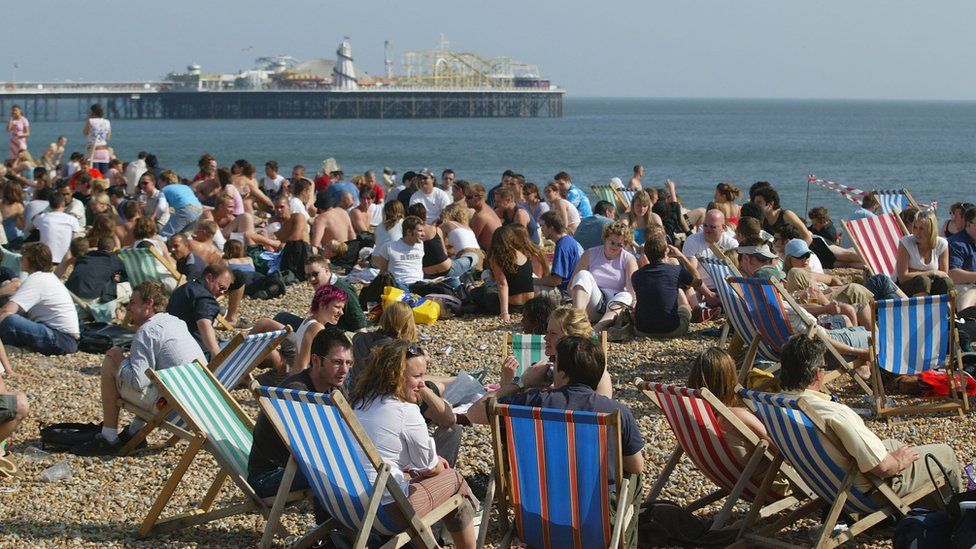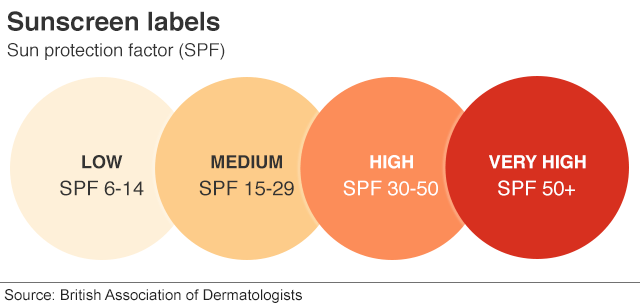
UK heatwave: How does sunscreen work?
Temperatures are forecast to reach 33C (91.4F) in parts of the south-east of England on Friday, as hot air spreads up from Spain, Portugal and north Africa.
People are advised to drink plenty of fluids, wear lightweight, light-coloured clothing, and a wide-brimmed hat, and to use a high-factor sunscreen.
What should I look for in sunscreen?
Most of us are familiar with sun protection factor (SPF), the big number on the front of your sunscreen bottle. The higher the number, the greater protection it offers.
Many brands also carry a five star rating too, and that might be just as important to understand.
SPF tells you how much protection your sunscreen provides from UVB radiation. The star system tells you the percentage of UVA radiation that is absorbed by the sunscreen in comparison to how much UVB is absorbed.
What are UVA and UVB?
Ultraviolet A and B refer to different wavelengths of radiation from the sun that enter the earth's atmosphere.
UVA is associated with ageing of the skin and pigmentation as well as skin cancer, particularly squamous cell carcinoma (the second most common type). It can affect human skin even through glass.
UVB causes sunburn, and is linked to particular types of skin cancer - basal cell carcinoma (the most common type) and malignant melanoma.
Sunscreen doesn't stop all types of skin damage so for maximum protection, it's recommended to cover up and seek shade when the sun is strongest.

What do the numbers mean?
The SPF number on a bottle of sunscreen refers to how much UVB it allows in, not how much it blocks.
A sunscreen with SPF 15 allows one-fifteenth of the sun's rays to reach your skin, or about 7%.
So it filters out about 93% percent of UVB rays while SPF 30 filters about 97%.
This means if you could stay in the sun for 10 minutes unprotected without burning, SPF 15 would in theory give you 15 times that protection, or two-and-a-half hours before you'd burn.
The number of stars refers to the percentage of UVA absorbed as a ratio of how much UVB is absorbed. The scoring ranges from one to five stars, with five stars being the most effective.
A low SPF sunscreen could have a high star rating, because the ratio of UVA to UVB protection is the same as in a higher SPF product.
Ideally, you want a sunscreen with a high SPF and a high star rating.

How effective is the best sunscreen?
These levels of protection assume sunscreen has been applied in ideal conditions.
In reality, most people don't apply sunscreen perfectly, and it can rub off with sweat or while in water. Experts think most people only apply half the recommended quantity.
The British Association of Dermatologists says sunscreen with SPF 30 is a "satisfactory form of sun protection in addition to protective shade and clothing", and that it should be reapplied at least every two hours, no matter what its SPF.
EU guidance states that sunscreen should only be marketed as having sun protection of "50+" and not use the ratings of 80 or 100 which can be found in some countries.
It thinks these could be misleading as to how much extra protection they provide: SPF 50 provides about 98% protection, while 100 would provide less than 100%.
No product provides 100% protection from the sun's rays.
What about 'once-a-day' sunscreens?
There are lots of "extended wear" sunscreens on the market that advertise themselves as being for use "once a day". Many claim to offer protection for up to eight hours - if applied correctly.
But some dermatologists recommend that these products should still be applied at least every two hours, like any other sunscreen, since the risk that you may have missed a spot - or that it will rub or wash off in that time - are too high.
A Which? report in 2016 criticised these products for not living up to their claims. It found that after six to eight hours, the average protection offered decreased by 74%.
Are you applying sun cream properly?










